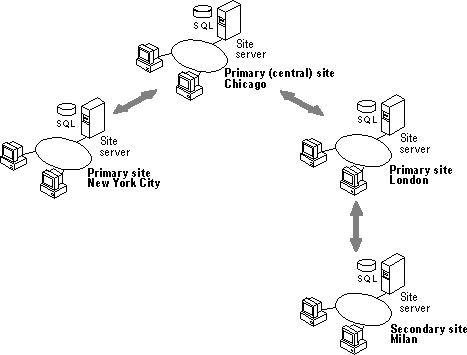
In a corporate environment where you may have hundreds, or even thousands, of computers, the process of upgrading to Windows 95 can become complex — especially if you want to deploy Windows 95 on all computers at the same time. This appendix discusses how you can use Microsoft Systems Management Server to automate the large-scale deployment of Windows 95, making the upgrade process faster, easier, and less expensive for your organization. It also describes the services offered by Systems Management Server for centralized management of computers in an enterprise network, including inventory, software distribution and installation, management of shared applications, remote management and troubleshooting, and network protocol analysis.
Systems Management Server organizes computers into a hierarchy of sites. A site is a group of servers and client computers typically located in a single geographical area. A site can consist of one or more domains (that is, a set of servers and clients that are managed as a group) existing on the same LAN.
Systems Management Server uses the terms central, primary, and secondary to identify the capabilities of sites in the hierarchy. A central site is a primary site at the top of the hierarchy, from which all sites and computers in the hierarchy can be administered.
A primary site has its own Microsoft SQL Server database, which contains all of the hardware and software inventory information for the site and its subsites (sites attached below it in the hierarchy). The primary site can run the Systems Management Server Administrator tool for local administration of the site server and all subsites. A primary site must be running Windows NT Server.
A secondary site is a site that does not have a SQL Server database or the Systems Management Server Administrator tool. This site is administered from any site above it in the hierarchy and has no subsites. A secondary site must be running Windows NT Server.
A primary site can have either secondary sites or other primary sites beneath it in the hierarchy. A secondary site must have a primary site above it and can have no sites below it.
The following figure illustrates a sample Systems Management Server hierarchy. The hierarchical site structure is depicted on the administration console, so that you can easily identify a computer based on its location.
